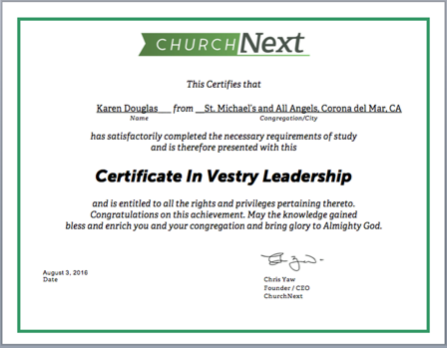Many churches look for ways to help new vestry members prepare to take on their responsibilities. Church leaders can make this process simpler by asking new vestry members to earn a ChurchNext Certificate in Vestry Leadership. Each member of your vestry team can earn this certificate by taking four classes designed to train them for their vestry duties:
- The Vestry Journey with Van Sheets For Individuals
- The Vestry Journey with Van Sheets For Groups
- Vestry Vision and Leadership with Charles Robertson For Individuals
- Vestry Vision and Leadership with Charles Robertson For Groups
- Vestry Team Building and Conflict with Bill Carroll For Individuals
- Vestry Team Building and Conflict with Bill Carroll For Groups
- Understanding Vestry Finances with Tom Post For Individuals
- Understanding Vestry Finances with Tom Post For Groups

We have designed these courses carefully to help vestry members learn about several important aspects of vestry ministry. New vestry members, or experienced members who would like to learn more about these aspects of their ministry, can take these courses as individuals, or they can build fellowship by taking together the versions of the classes formatted for group learning and discussion. They might do so at a vestry retreat, for example, or as part of a vestry orientation.At the end of the final class, students may click on the link that we provide, and we will send each of them a signed, personal certificate of completion.
 In The Vestry Journey, Van Sheets discusses the role of vestry leaders in the church. He offers guidance about how to adapt to vestry ministry, resources to which vestry members can look for guidance, and helpful attitudes and mindsets to bring into vestry work.
In The Vestry Journey, Van Sheets discusses the role of vestry leaders in the church. He offers guidance about how to adapt to vestry ministry, resources to which vestry members can look for guidance, and helpful attitudes and mindsets to bring into vestry work.
In Vision and the Vestry, Charles Robertson guides vestries in  creating a “sacred bundle” of values, ministries, and ideas that are most important to their particular congregations. He discusses ways to create goals based on these sacred ideas, and how to ensure that the church builds toward these goals in its ministries.
creating a “sacred bundle” of values, ministries, and ideas that are most important to their particular congregations. He discusses ways to create goals based on these sacred ideas, and how to ensure that the church builds toward these goals in its ministries.
In Vestry Team Building and Conflict, Bill Carroll offers guidance on  ways to base the vestry ministry in a sacred fellowship that can offer a foundation for discussion and decision-making. He identifies strategies for building fellowship on a vestry and for managing conflict and anxiety during difficult times.
ways to base the vestry ministry in a sacred fellowship that can offer a foundation for discussion and decision-making. He identifies strategies for building fellowship on a vestry and for managing conflict and anxiety during difficult times.
In Understanding Vestry Finances, Tom Post discusses the financial duties that vestry members assume as part of their ministry. He emphasizes the importance of all vestry members’ participation in financial  oversight and discusses (in plain English) how vestries should handle financial reporting and building budgets.
oversight and discusses (in plain English) how vestries should handle financial reporting and building budgets.
Several church leaders who have been consulted about these classes have offered their opinions about the courses’ great value for churches who would like a way to introduce new vestry members to this ministry. For example, Roger Ferlo, President Bexley Seabury Seminary has written: The ChurchNext series of courses for Vestry leaders offers a robust, thorough introduction to the joys and challenges of vestry leadership.” Kirk Smith, Bishop of the Episcopal Diocese of Arizona, has said, “This is a convenient, practical way to gain essential information for new and veteran vestry members.”
We hope that as your church members learn more about leading your congregation, these classes help them do the work of Christ in their churches and communities.











